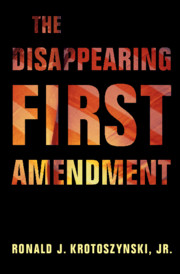Book contents
- The Disappearing First Amendment
- The Disappearing First Amendment
- Copyright page
- Dedication
- Contents
- Preface
- Acknowledgments
- Table of Cases
- 1 Two Steps Forward, One Step Back
- 2 The Public Forum Doctrine and Reduced Access to Government Property for Speech Activity
- 3 The First Amendment As a Source of Positive Rights
- 4 Whistleblowing Speech and Democratic Accountability
- 5 Shedding Their Constitutional Rights at the Schoolhouse Gate
- 6 Transborder Speech
- 7 Systemic Failures to Protect Newsgathering Activities by Professional Journalists and Amateur Citizen-Journalists Alike
- 8 The Citizen As Government Sock Puppet and the State Masquerading As a Citizen
- 9 Using Constitutionally Permissible Statutes to Impede First Amendment Activity
- 10 Conclusion
- Notes
- Index
7 - Systemic Failures to Protect Newsgathering Activities by Professional Journalists and Amateur Citizen-Journalists Alike
Published online by Cambridge University Press: 02 August 2019
- The Disappearing First Amendment
- The Disappearing First Amendment
- Copyright page
- Dedication
- Contents
- Preface
- Acknowledgments
- Table of Cases
- 1 Two Steps Forward, One Step Back
- 2 The Public Forum Doctrine and Reduced Access to Government Property for Speech Activity
- 3 The First Amendment As a Source of Positive Rights
- 4 Whistleblowing Speech and Democratic Accountability
- 5 Shedding Their Constitutional Rights at the Schoolhouse Gate
- 6 Transborder Speech
- 7 Systemic Failures to Protect Newsgathering Activities by Professional Journalists and Amateur Citizen-Journalists Alike
- 8 The Citizen As Government Sock Puppet and the State Masquerading As a Citizen
- 9 Using Constitutionally Permissible Statutes to Impede First Amendment Activity
- 10 Conclusion
- Notes
- Index
Summary
Democratic self-government relies on the ability of citizens to make informed decisions about the government – more specifically, elections can serve as a mechanism for securing government accountability only if voters possess the necessary information to make well-informed electoral choices. As noted earlier, in Chapter 4 regarding the contributions that government employees can make to facilitating the process of democratic self-government,1 the Fourth Estate plays a crucial role in making democracy function. In order for journalists to perform this critical role, however, it is essential that they be able to engage in newsgathering activities;2 reportage cannot exist in the absence of the newsgathering activities that make reportage possible.3
Moreover, in the age of the internet, the electorate receives news and information not only from traditional media outlets, such as local and national television newscasts, and print newspapers, but also through amateur citizen-journalists who post important information to web-based platforms.4 Even if citizen-journalists cannot, and should not, displace completely professionally trained journalists, they can and do make significant contributions to the marketplace of ideas – contributions that help voters make better informed choices on election day.
- Type
- Chapter
- Information
- The Disappearing First Amendment , pp. 151 - 175Publisher: Cambridge University PressPrint publication year: 2019



